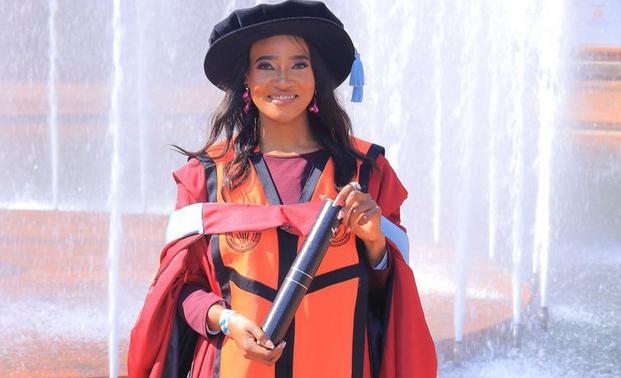News / National
Lulu Brenda Harris earns her PhD
30 Jul 2025 at 14:35hrs |
0 Views

A growing number of Zimbabwean journalists are pursuing Doctor of Philosophy (PhD) degrees at universities across the world in a bid to sharpen their critical thinking, analytical writing, and media skills. This academic shift reflects a broader effort by media professionals to elevate the quality, depth, and impact of journalism in the country.
This week, Bulawayo-based journalist Lulu Brenda Harris became the latest media practitioner to earn a PhD. She graduated with a Doctor of Philosophy in Communication Studies from the University of Johannesburg (UJ) in South Africa on Monday.
Harris, who works for the Centre for Innovation and Technology (CITE), an online media platform founded by veteran journalist Zenzele Ndebele, completed her thesis titled "Transition in Context and Contexts of Transition: An Investigation of Journalism Practice Post-Coup Zimbabwe." Her academic journey was guided by Professor Nyasha Mboti, head of UJ's communication studies department and a renowned Zimbabwean scholar who previously lectured at the University of the Free State.
Harris joins a growing list of Zimbabwean journalists who have recently attained PhDs. Among them are Limukani Ncube and Brian Hungwe, the latter also a trained lawyer. Their achievements underscore a trend where local journalists are investing in higher education, not only for personal growth but also to contribute meaningfully to the evolving media landscape.
Although a PhD is not a prerequisite for mainstream journalism - especially in day-to-day reporting - it is increasingly viewed as an asset. It equips journalists with advanced research capabilities, the ability to interrogate complex socio-political issues, and a platform to contribute to scholarly work on media and communication.
Experts say PhD-trained journalists are better positioned to interpret media trends, understand the shifting communication landscape, and make editorial decisions grounded in research. For those transitioning into academic or policy advisory roles, the qualification also opens doors in teaching, consultancy, and institutional development within the broader communication field.
As more Zimbabwean journalists take this path, the country's media industry is poised to benefit from enhanced analytical depth, innovation, and professionalism in content production and newsroom management.
This week, Bulawayo-based journalist Lulu Brenda Harris became the latest media practitioner to earn a PhD. She graduated with a Doctor of Philosophy in Communication Studies from the University of Johannesburg (UJ) in South Africa on Monday.
Harris, who works for the Centre for Innovation and Technology (CITE), an online media platform founded by veteran journalist Zenzele Ndebele, completed her thesis titled "Transition in Context and Contexts of Transition: An Investigation of Journalism Practice Post-Coup Zimbabwe." Her academic journey was guided by Professor Nyasha Mboti, head of UJ's communication studies department and a renowned Zimbabwean scholar who previously lectured at the University of the Free State.
Although a PhD is not a prerequisite for mainstream journalism - especially in day-to-day reporting - it is increasingly viewed as an asset. It equips journalists with advanced research capabilities, the ability to interrogate complex socio-political issues, and a platform to contribute to scholarly work on media and communication.
Experts say PhD-trained journalists are better positioned to interpret media trends, understand the shifting communication landscape, and make editorial decisions grounded in research. For those transitioning into academic or policy advisory roles, the qualification also opens doors in teaching, consultancy, and institutional development within the broader communication field.
As more Zimbabwean journalists take this path, the country's media industry is poised to benefit from enhanced analytical depth, innovation, and professionalism in content production and newsroom management.
Source - online
Join the discussion
Loading comments…
































